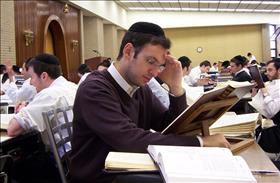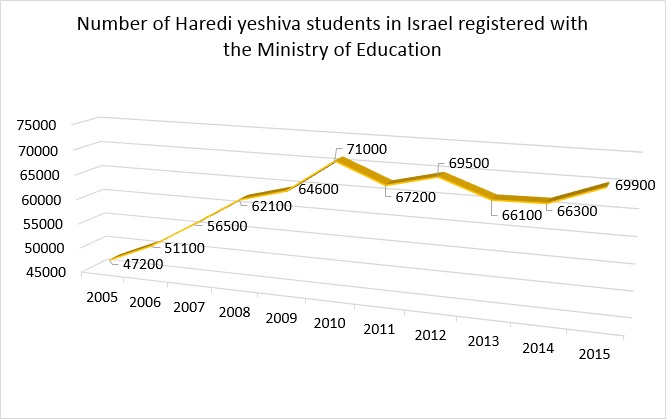Hiddush report: Down from 61% to 50% over the past five years
The number of Haredi yeshiva students has fallen for the past 5 years
According to the Ministry of Education, the rise in the number of ultra-Orthodox yeshiva students has stopped, holding steady at approximately 70,000. The percentage of ultra-Orthodox men studying full-time in yeshivas dropped over the course of recent years from 61% to 50%.
20/06/2016 16:59
Tags: yeshivas · yeshiva budget

Ultra-Orthodox yeshiva students studying Torah, courtesy: Wikipedia
According to the Ministry of Education, the rise in the number of ultra-Orthodox yeshiva students has stopped, holding steady at approximately 70,000 for the past five years. Further, the percentage of ultra-Orthodox men studying full-time in yeshivas dropped over the course of recent years from 61% to 50%.
Hiddush published this research analysis, conducted by Hiddush Vice President of Research and Information, Mr. Shahar Ilan. The data were received from the Ministry of Education in response to Hiddush's Freedom of Information request. The purpose of the report was to determine the extent to which ultra-Orthodox men were integrating into the workforce, serving in the IDF, and enrolling in institutions of higher learning, compared to those who were studying in yeshivas and kollels.

This shows significant progress, but the road ahead is still long and difficult. It is good to see that the challenging battle of many years to integrate ultra-Orthodox men into the IDF and Israel's workforce is beginning to bear fruit. It seems that we are moving towards a new, healthy reality in which the majority of ultra-Orthodox men are working, and many ultra-Orthodox yeshiva students are making independent, responsible decisions, rather than succumbing blindly to their religious leaders. The current 50% of ultra-Orthodox men who are studying in yeshivas, rather than pursuing employment or service to their country is still disastrous for the future of Israel's economy, but there is no doubt that this is a clear sign of considerable progress. The good of Israeli society as whole, and of Haredi society in particular, demand that only the very most elite adult yeshiva students immerse themselves in full-time, government funded Torah study.
The ultra-Orthodox political parties and the heads of Israel's yeshivas will do everything within their power to stem the tide of yeshiva students entering the workforce, striving to keep them impoverished and dependent upon government subsidies.
Such changes do not simply happen on their own. The ultra-Orthodox political parties and the heads of Israel's yeshivas will do everything within their power to stem the tide of yeshiva students entering the workforce, striving to keep them impoverished and dependent upon government subsidies. The increased government funds for yeshivas and benefits they receive directly from the public coffers serve to perpetuate their lives of poverty. The state of Israel must bow both to the economic reality and to the Israeli public's will, and internalize that not everything can should be put up for sale.
Hiddush's report reveals that the steady inrease in the number of ultra-orthodox full-time adult yeshiva students, who are registered with the Ministry of Edcuation, has halted. The number of such students is now staying steady at around 70,000, and has dropped by 2% annually over the course of recent years (2010-2015). This is in comparison to an increase of 51% over the five preceding years (an annual increase of 8% from 2005-2010). The drop is primarily due to the increasing number of ultra-Orthodox men enlisting in the IDF, entering the workforce, and pursuing professional and academic studies.
If the previous trend had continued, with the number of yeshiva students increasing as it had from 2005-2010 at 8% annually, there would now be more than 104,000 full-time yeshiva students (rather than 70,000) funded by the Ministry of Education. This would be 47% more than currently.
Notably, according to Hiddush's report, the government budget for yeshivas has fluctuated by half a billion shekels up or down, depending upon the political clout of the ultra-Orthodox parties over the years, and whether they found themselves in the Opposition or the Coalition. Over all, the government budget for yeshivas has increased over the years covered by Hiddush's report, from 550 million shekels to more than one billion shekels. PM Sharon's Government Coalition, which included the civic Shinui party, was in power in 2005; and the ultra-Orthodox parties returned to power in 2015, nearly doubling the budget for yeshivas. In the intervening years, that budget rose and fell by half a billion shekels annually.